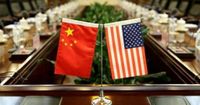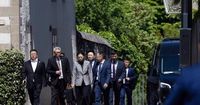President Donald Trump has hailed the recent trade negotiations with China, which took place in Switzerland on May 10, 2025, describing the discussions as a "complete reset" in the relationship between the two superpowers. The meeting, which lasted for about eight hours, was held in Geneva and was the first direct contact between U.S. and Chinese officials since the onset of escalating tariffs imposed by both nations.
In a post on his Truth Social platform, Trump stated, "A very good meeting today with China, in Switzerland. Many issues were discussed, and many agreements were reached." He emphasized the importance of opening the Chinese market to American businesses, saying, "We want to see China more open to American businesses for the benefit of both China and the U.S. Great progress!" However, Trump did not provide specific details regarding the agreements made during the talks.
The Chinese delegation, led by Deputy Prime Minister Ha Lap Phong, engaged with U.S. Treasury Secretary Scott Bessent and U.S. Trade Representative Jamieson Greer. This meeting was particularly significant as it aimed to ease the trade war that has threatened the global economy. The discussions are set to continue on May 11, 2025, at a location yet to be disclosed.
As the negotiations concluded on May 10, both sides refrained from issuing statements about the content of their discussions, which ended around 8 p.m. local time. This lack of communication has left many observers speculating about the outcomes of the meeting. The ongoing trade dispute has seen tariffs rise above 100%, with the U.S. imposing a 145% tax on Chinese imports, while China retaliated with a 125% tax on U.S. goods.
Analysts have noted that the meeting in Geneva represents a critical juncture in U.S.-China relations, with some expressing cautious optimism about the potential for a resolution. Alejo Czerwonko, an investment director at UBS, remarked, "This is the starting point. Hundreds of billions of dollars in trade are at stake, and the current tariffs are equivalent to a de facto embargo. The worst-case trade scenario may not occur."
Despite this optimism, skepticism remains among experts regarding the likelihood of a significant breakthrough in the negotiations. Thierry Wizman from Macquarie investment bank stated, "We are still skeptical that direct negotiations between the U.S. and China will lead to a major agreement." Meanwhile, Liqian Ren, director at WisdomTree Asset Management, emphasized the need for both nations to make concerted efforts to reduce trade tensions.
The backdrop to these negotiations is a series of retaliatory tariffs that have disrupted supply chains and destabilized financial markets, raising fears of a global recession. Washington seeks to reduce its $295 billion trade deficit with Beijing and demands that China abandon what it perceives as unfair economic practices. Conversely, Beijing has called for a reduction in tariffs and clearer communication about what the U.S. expects China to purchase.
On May 9, Trump had indicated that an 80% tax on Chinese goods seemed reasonable, reinforcing the aggressive stance his administration has taken on trade issues. This rhetoric has added to the tension, with many in the investment community closely monitoring the outcomes of the Geneva talks.
As the negotiations unfold, it remains to be seen whether a constructive atmosphere will emerge from these discussions. The outcome will likely have significant implications not only for U.S.-China relations but also for the broader global economy. The stakes are high, and both nations are under pressure to find common ground amidst rising economic nationalism.
In the lead-up to the negotiations, Swiss Economic Minister Guy Parmelin met with both delegations, highlighting the importance of a diplomatic approach to resolving the trade dispute. The ongoing dialogue is viewed as a necessary step to prevent further escalation of tensions that could have dire consequences for global trade.
As the world watches closely, the hope is that these talks will pave the way for a more stable economic relationship between the U.S. and China. The future of hundreds of billions of dollars in trade hangs in the balance, and both nations must navigate their differences carefully to avoid a further deterioration of relations.






